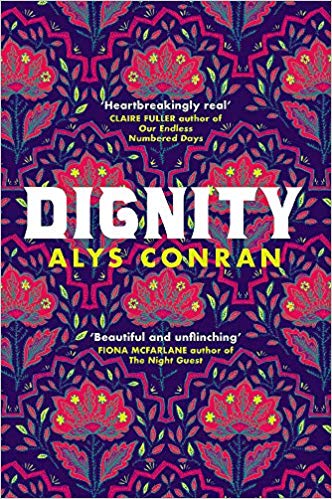Kathryn Tann reviews Dignity, the second novel of Wales Book of the Year-winning author Alys Conran.
Alys Conran’s second novel, Dignity, breathes with the same kind of life that her first – the much loved Pigeon – did. It steps away from her familiar Wales and into the dual worlds of British Empire, but through characters as close to the ground as ever. Dignity continues Conran’s preoccupation with lingering pasts, oppressive memory, and the ongoing impact of family history. Here, it is given the backdrop of England’s own familial ties – the dark marks within its recent past which continue to shape our culture.
 Dignity dips into the consciousness of three women and two times. Magda is an elderly dependent – once a chemist – living alone in her large Victorian house on the English coast. Her life is book-ended by two other narrations: her mother, who was a young British wife in pre-war colonial India, and Susheela, a local student and part-time carer, who now brings the realities of the outside world unapologetically into the old, defensive walls of Magda’s home. Each chapter flits between the three women’s perspectives, later on including a young Magda’s experience as well. This jumping back and forth with each chapter was used in Pigeon too – and once again, Conran avoids any jolting. She drops from one life into another, making distinct seams in the narration somehow feel seamless, even across decades.
Dignity dips into the consciousness of three women and two times. Magda is an elderly dependent – once a chemist – living alone in her large Victorian house on the English coast. Her life is book-ended by two other narrations: her mother, who was a young British wife in pre-war colonial India, and Susheela, a local student and part-time carer, who now brings the realities of the outside world unapologetically into the old, defensive walls of Magda’s home. Each chapter flits between the three women’s perspectives, later on including a young Magda’s experience as well. This jumping back and forth with each chapter was used in Pigeon too – and once again, Conran avoids any jolting. She drops from one life into another, making distinct seams in the narration somehow feel seamless, even across decades.
Each piece of experience, personality, and history, are fitted carefully together into Dignity like pieces of a puzzle. Crucially however, and in true Conran style, Dignity is a puzzle with no fixed border. It spills out with its questions and unlocked ideas.
Alys Conran also has a certain freedom with her style – again, it is not contained by the margins of conventional storytelling. She writes in an organic imitation of true experience, inhabiting each character fully with her words. Magda in particular has a distinct mind – one often teetering on the edge of breakdown. Magda’s experience is tied to her house: her thoughts, like the rooms, are sharp and orderly, but ageing and vulnerable also. She both clings to the past, and is trapped by it.
We know how Magda came to be – through the telling of her mother Evelyn’s sad story – but initially there is empty space between those early years of life under patriarchal rule in India and the life we see now; of a sour woman, wheelchair-bound and isolated. Conran gradually sketches in the life lived by Magda – jaded by early tragedy and trauma – the memories of which now return in ghostly ways. This full-circle connection between young child and dying woman is powerfully rendered, spreading relevance across the years and pulling Susheela in as a symbol of hope for the next generation. Evelyn and Magda were stripped of the simplicity of ‘Home’ – a feeling of complete belonging – but their experiences seem to pave a bittersweet way for Susheela’s search for her own ‘desh’.
Susheela provides a brilliant contrast to Magda. Being bound to the woman by a similar boldness, the loss of a mother, and by the Empire she never saw, Susheela awakens the part of Magda which, despite her self-inflicted isolation, has longed for human connection. On occasion, however, certain elements of Susheela’s personality, and certain actions, feel less authentic. Her repetition of the f-word is a little numbing to the otherwise rich narration, and her inaction over certain circumstances – her pregnancy, her breakup, her father’s debt – could for some be frustrating absences. To juggle multiple plots, however, inevitably requires a certain level of omission, and overall Conran has chosen her details expertly. Any meagre criticisms are, with a novel such as Dignity, simply pernickety.
Conran spans the generations with great believability. My favourite chapters for most of the first half were those set in a golden-tinted colonial India. The transportation to this different world is made fascinating; particularly through the innocent eyes of young Evelyn. As her perspective shifts with the waning of her previous hopefulness, Evelyn shifts too. As with Magda, Conran is unafraid of bringing change to her characters: events and circumstances, cruel husbands and societal expectations, are enough to warp a person. It is an often irreversible truth of many lives, and so it is a truth included in Dignity, regardless of the happy resilience we would like to see in its place. Magda and Evelyn are both women made hard by their experience – but Susheela and Ewan are placed before us as a reason for hope.
Alys Conran has given a sort of gentleness to her second novel which is seldom found. As the story meanders between the lives these three women, its reader is carried – willingly – through their separate experiences. More than its offering of Evelyn, Susheela and Magda, Dignity is a novel which calmly asks the daunting questions left by the Empire. Most powerfully, it does so through the open mind of little Magda, caught between two notions of ‘Home’ she cannot reconcile:
“I stand up. She is wrong. She is obtuse. We are not out here. We are in.
Home is something terrible, and I am afraid of it.”
Dignity is available now from W&N.
Photo credit: Anna Milner
You might also like…
Bill Rees reviews Pigeon, the debut novel from Alys Conran, and finds a narrative that is “thoroughly engaging” and “heart wrenching”.
Kathryn Tann is a contributor to Wales Arts Review.











